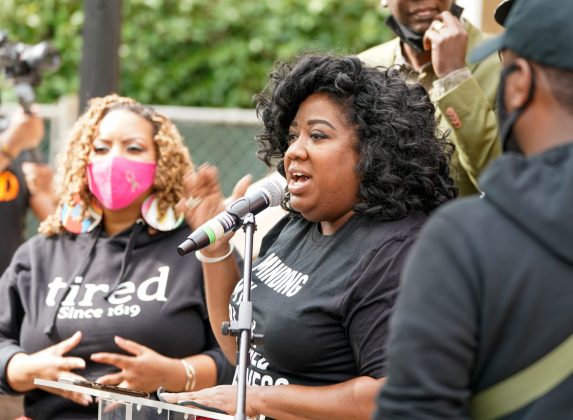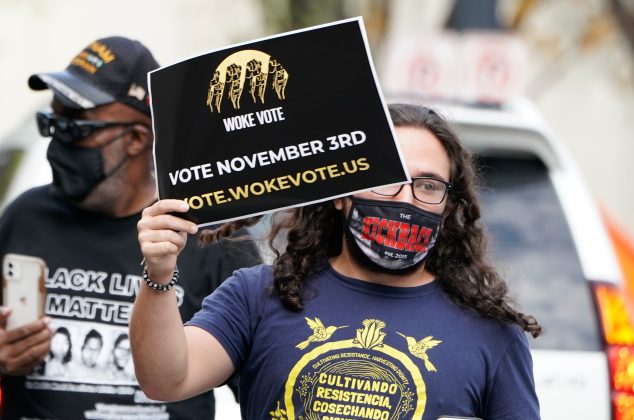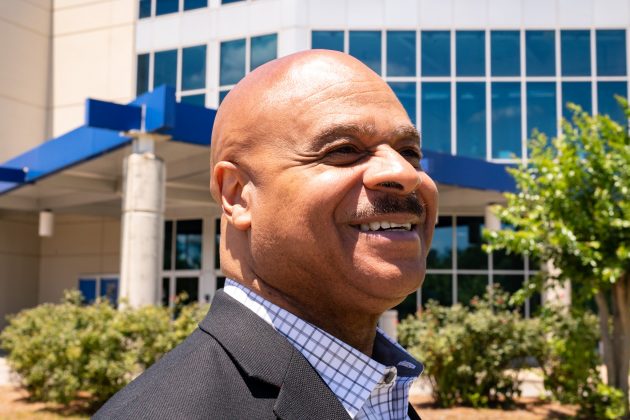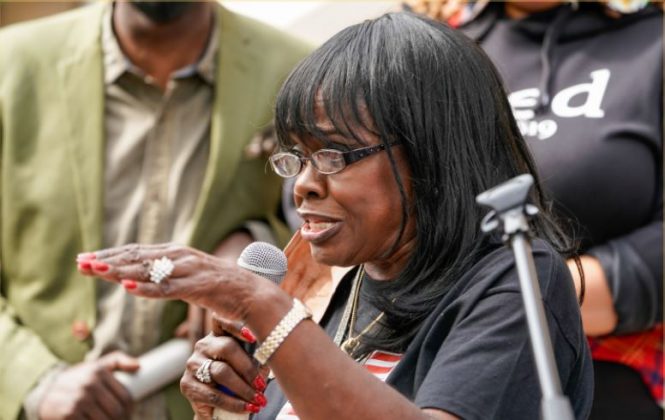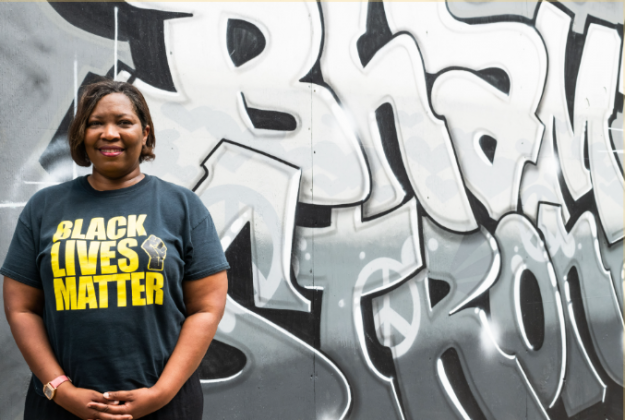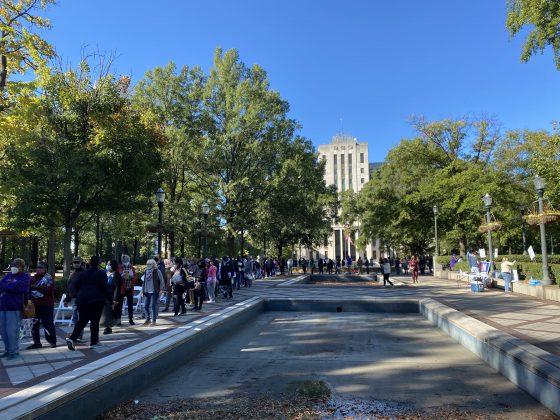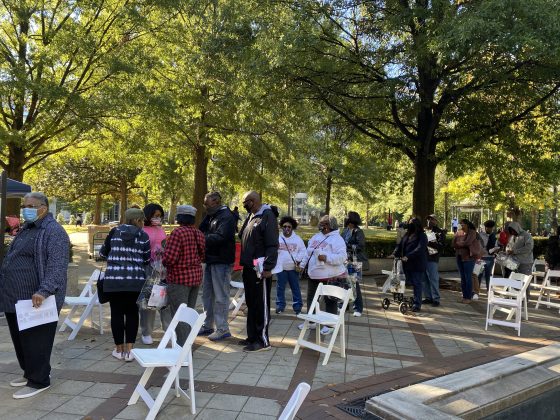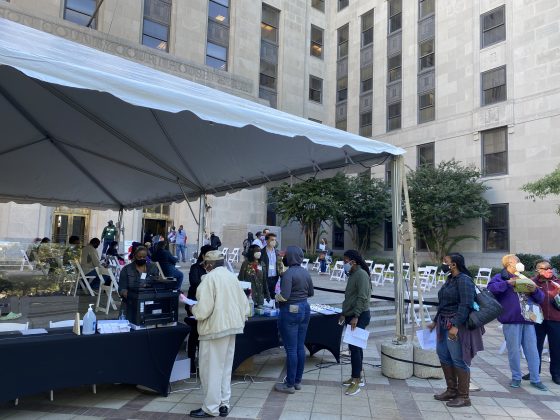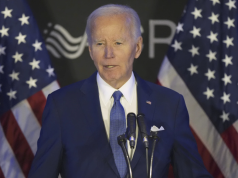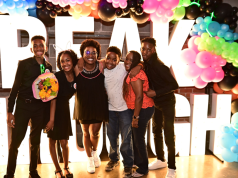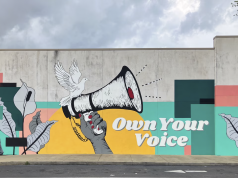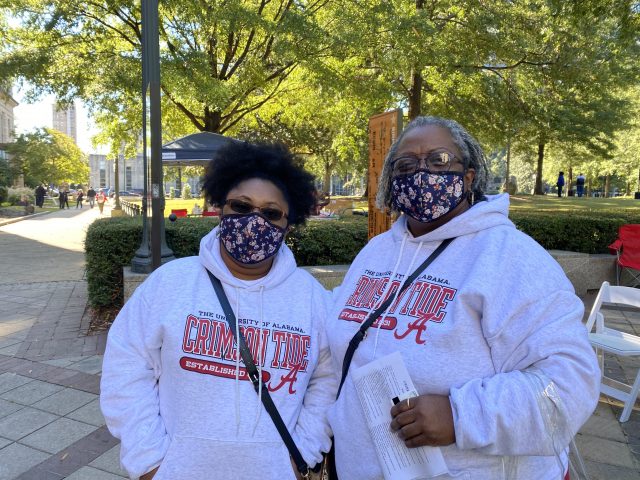
By Erica Wright
The Birmingham Times
Maya Robinson was determined to vote—even if it meant standing outside the downtown Birmingham courthouse for several hours on a frigid Saturday morning earlier this month.
“This is the biggest election ever,” said the Birmingham resident. “It’s been a really rough year and, now more than ever, we are motivated to get out and make sure our votes count.”
Robinson is one of more than 2,000 people who have shown up at the Jefferson County courthouses in Birmingham and Bessemer over two Saturdays for in-person absentee voting days ahead of the November 3 general election. That’s not counting thousands of others who came to the courthouse during the week.
The first Saturday saw a cold snap with temperatures near 30 degrees, while the second Saturday saw a widespread, soaking rain—but the weather conditions didn’t stop thousands from filing absentee ballots in Alabama’s most populous county, a record number of people according to state officials.
There’s a reason that voters like Robinson, 35, and her mother, Barbara, 60, stood in long lines, some for hours, to cast their vote in next week’s presidential election, according to area civic leaders.
“This really means life or death,” said the Rev. Gwen Webb, a longtime Birmingham Civil Rights Activist and president of the Inglenook Neighborhood Association. “[With] all the progress that has been made for us, … I don’t plan on going backward or dying in the process by not doing what we should do. It’s important to vote.”
“It’s Personal”
DeJuana Thompson, partner at Think Rubix LLC and creator of Woke Vote, which has mobilized tens of thousands of voters over several elections, said energy from the public this year is a reflection of how people view their vote.
“It really is to save their own lives, to save the lives of people in their families, and to take care of their communities,” she said. “It’s a personal thing.”
Bishop Jim Lowe, senior pastor of Guiding Light Baptist Church, said voting is crucial because elected officials can determine our way of life.
“We choose them, and they choose what they will do or not do for us. That’s the most important thing,” he said. “When we choose a person, they decide what type of life we’re going to live. … It is very important that we choose the right kind of people to make the right kind of decisions. Those lives can be blessed lives, following what God says, or they can make decisions that go against what God says. We must vote.”
This election has gotten the attention of voters like never before, and there are several reasons for that, according to some area activists and clergy.
“The murders of unarmed Black people at the hands of police have been happening way before now, but the murders of George Floyd and Breonna Taylor [at the hands of police earlier this year] … woke a lot of people up,” said Cara McClure, co-founder of Black Lives Matter Birmingham. “Folks are seeing and saying, ‘Enough is enough.’ That’s why we’re saying vote in defense of Black lives.”
Floyd was killed by a Minneapolis, Minnesota, police officer in May, and Taylor was killed by Louisville, Kentucky, police officers in her home in March. Both deaths ignited widespread protests and put a spotlight on racial injustice nationwide.
This is no time to sit on the sidelines and complain about what’s happening in the country, McClure said: “Voting is one of the most important tools we have at our disposal, but it is not our only tool. … We believe in policy, protests, and polls.”
Thompson agreed.
“People view this vote as a way to really say and state their values, … a way of protesting what’s been happening at the highest levels of government and at the local levels. I think [voters] are saying, ‘If I can’t do anything else, the one thing I can do this time is vote. I can vote my conscience. I can vote my values. I can vote my morals. I can vote for the things I care about, the people I’ve lost.’”
Clarence Muhammad, with Triumph Youth and Adult Community Development, a local organization that provides emergency assistance and food bank services to residents in Jefferson County and surrounding areas, said this may be one of the first elections that puts Black issues, such as reparations, economics, criminal justice reform, and prison reform, on the table.
“We have to have an agenda when anybody asks us to vote for them, whether they are Black or white, male or female, Democrat or Republican,” he said.
Mary Jones, co-director of direct services for Greater Birmingham Ministries, said issues such as poverty cannot be overlooked in the election.
“What are your priorities? We don’t think about that. We don’t have time for that because poverty … prevents us from thinking about our lives and where we are,” she said. “If you don’t have money or a job or transportation, how can you mix all that up and say, ‘Which one can I do today?’ People are calling this an important election, but I think every election is important.”
COVID-19
Another issue on the minds of voters is the ongoing COVID-19 pandemic
“More than 220,000 people have died, and [experts] predict more than 400,000 will be dead by the end of the year. … Somebody should be held responsible for that,” said Rev. Harold Bass, pastor of Olivet Monumental Baptist Church in North Birmingham and founder of Clergy Concerned for the Community Inc. (CCC), during a press conference this month. “It is time for us to vote to change the narrative, to change the flow and spirit of our country. … If we are going to get some help, we have to first do some things for ourselves. One of the things we can do for ourselves is go to the polls and vote.”
Jai Gregory Clarke, of Faith in Action Alabama, said, “Many fought, bled, and died for us to have the right to have our voices heard in our public offices, so this is a very important election. … I feel like every election, whether local or national, is important. … It’s more important than ever that we recognize the sacrifices people have made for us to vote. No democracy can be truly free until every voice is heard.”
Lowe said this election is about choosing between things that are godly and things that are less godly.
“Each individual must decide for themselves how they will vote, so I do think it is important,” he said. “I don’t see it the way that others do. I see it as a choice between Christ and things that are anti-Christ. The Bible says that in the last days people will choose between Christ and things that are anti-Christ, and that is how I see this election. I believe we have a responsibility to elect godly men and women, people who have a biblical worldview, not a political worldview. We should make our decisions based upon what God says, not what politics say.”


